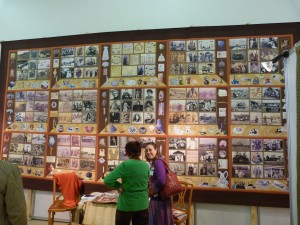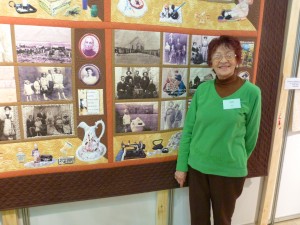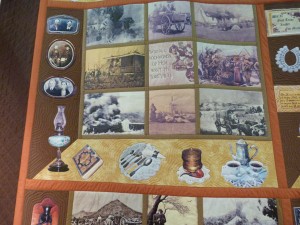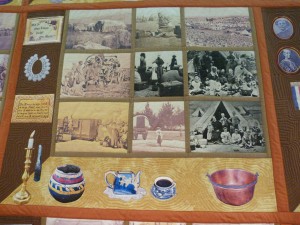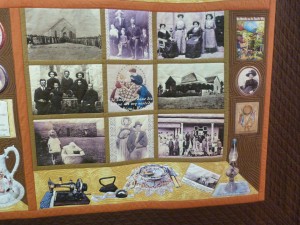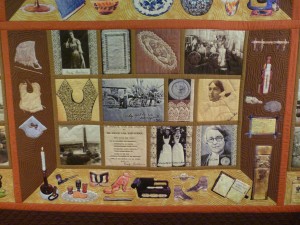The huge Heritage Quilt of the Boer Republics was on display at the quilt show at Quilt Festival. It was made for the National Women’s War Museum located near the War Memorial in Bloemfontein to honor the role and struggles of South African women during early settlements, the Boer War and post-war recovery (1870’s to 1920’s). This recently completed quilt, which measures 3 meters x 2.5 meters, was begun in 2010. Naomi Moolman (pictured below with the quilt) gathered the historic photographs from the War Museum and from her own collection and had them printed on cotton. The quilt was pieced and quilted by Petro van Rooyen and Magda Kriek of Pretoria.
Naomi was at the show every day, sharing this amazing piece and telling stories about the women in the photographs. There are three rows of five attic window blocks. The top row is of family photographs during the last 30 years of the nineteenth century and the second row focuses on the brutal Anglo-Boer war when Boer settlements were burnt and pillaged and women and children were sent to prisoner of war camps (two blocks shown below).
The third row examines the return to homes in the post war period of the 1920’s. Naomi told us about Elizabeth Lotz who’s photo is in the right hand picture at the bottom right. Elizabeth was a nurse in the Cape Town area. During the Boer War, when she was eight years old, the English came to their farm and shot her father. Her mother was told dig a grave and bury him. Then she and her mother were taken away to a prisoner of war camp. Story has it that she was so angry that she kicked and bit a soldier. After the war, she trained as a nurse. When she was offered the position of matron, she accepted on the condition that the nurses be allowed to talk to patients in their native tongue and not just in English. She also insisted that nurses should be trained in Afrikaans as well as English, and she got her way.
This quilt is an extraordinary testimony to the challenges of every day life and war in a turbulent period of history. My historical knowledge is poor, and this was a wake up call, reminding me how fortunate many of us are to live our comfortable lives without the sorts of struggles that these women endured.
